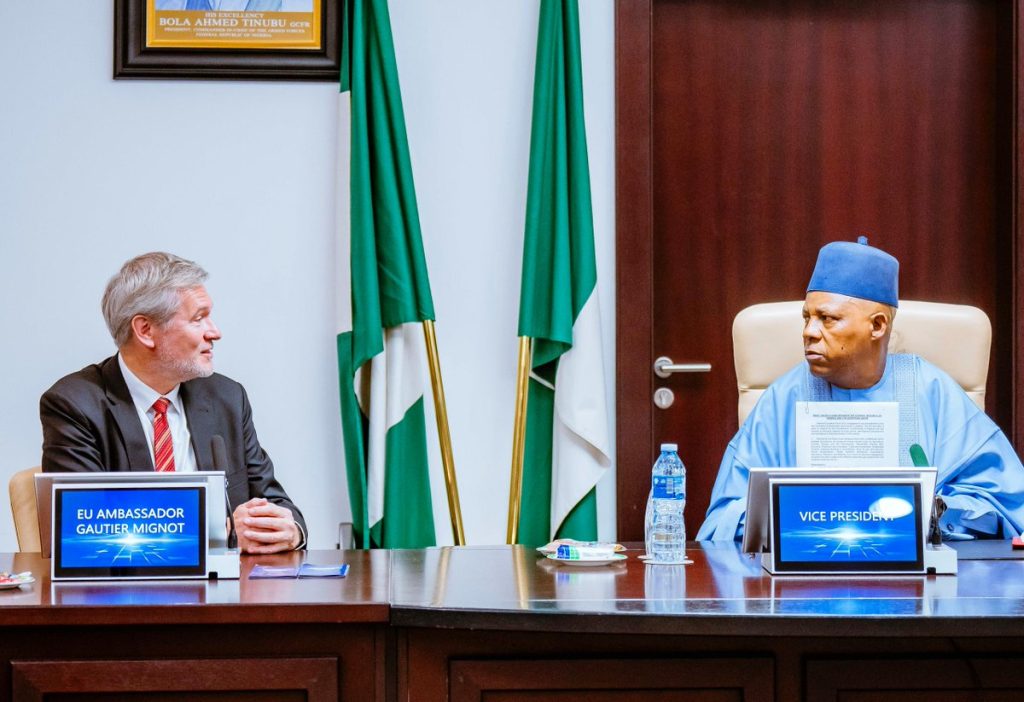The Nigerian government has reaffirmed its commitment to deepening its strategic partnership with the European Union (EU), as the European Bank for Reconstruction and Development (EBRD) prepares to open its first office in West Africa, based in Lagos.
This milestone comes after Nigeria became the 77th shareholder of the EBRD in February 2025.
The bank’s expansion into Sub-Saharan Africa was approved by the EBRD Board of Governors in 2023.
During a courtesy visit by Ambassador Gautier Mignot, Head of the European Union Delegation to Nigeria and ECOWAS, to the Presidential Villa yesterday, Vice President Kashim Shettima praised the EU’s longstanding support.
He emphasised the increasing opportunities for cooperation in trade, investment, and youth empowerment.
READ ALSO: Nigeria police resumes issuance of tinted glass permits
“You are our natural partners and allies. Beyond the geography that binds us, we have a cultural affinity that goes back centuries,” Shettima said.
He highlighted that Nigeria is entering a new phase of economic openness under President Bola Tinubu, noting that the President had made bold moves to address long-standing structural challenges.
“Some of the dysfunctions in the Nigerian economy – the opaque exchange rate regime and the fuel subsidy – President Tinubu dared to remove them. All the encumbrances towards investment in this country are gradually being eliminated,” he added.
Welcoming the EBRD’s expansion into Nigeria, Shettima called the opening of its Lagos office a symbolic and strategic development that would send a strong message: “More than ever before, Nigeria is ready for business.”
He also acknowledged the EU’s significant humanitarian and stabilisation efforts, particularly in conflict-affected regions like Borno State, where he previously served as governor.
“I know the prominent role that the EU played in stability and humanitarian support in Borno State. You deserve commendation, not condemnation. We will always stand by those who stood by us in our hours of need,” Shettima stated.
Additionally, he addressed migration cooperation and praised the ongoing efforts under the EU-Nigeria Readmission Agreement.
He urged the revitalisation of youth-focused programmes, such as the Nigeria Jubilee Fellows Programme (NJFP).
“There is a need for us to recalibrate the programme for the good of our young men and women,” he said.
READ ALSO: 2027: Tinubu needs second term to sustain reforms – Keyamo
However, EU Ambassador Gautier Mignot expressed the EU’s strong commitment to Nigeria, especially in light of the global political climate.
He reiterated that the EU sees Nigeria as a key partner in the 21st century.
“We are determined to keep our commitment globally and here in the region and Nigeria in terms of partnerships, cooperation, and humanitarian aid,” Mignot said.
He added that the EU stands firmly for free and fair trade, mutual benefits, and respect for sovereignty.
In another key development, Shettima lauded the proposal for a partnership between Nigeria and the Asia Economic Development Committee (AEDC) of South Korea to manufacture solar equipment and electric vehicles, as well as advance information technology for security enhancement in Nigeria.
Speaking during a courtesy visit by a delegation from AEDC, led by Chairman Yoon Suk-hun, stated that Nigeria was ready for partnerships that would support the industrialisation agenda of President Tinubu’s administration and improve the lives of citizens.
“Nigeria is open to and interested in any form of arrangements that will lead to the transfer of technology and the establishment of industries for solar equipment production and electric vehicle manufacturing,” he stated.
READ ALSO: Nigerian parents don’t scold kids who provide for the family, Rema claims
He reiterated the Tinubu administration’s commitment to fostering a conducive environment for private investment in Nigeria, assuring the AEDC delegation of government cooperation in their ventures.
“This government wants to be the facilitator for businesses to thrive in Nigeria. We will create a safe passage and a conducive environment for private businesses like yours to thrive,” the Vice President affirmed.
Yoon Suk-hun, leading the AEDC delegation, explained that their proposal to invest in Nigeria was driven not by profit maximisation but by a desire to transfer technology in key areas such as solar energy, electric vehicles, and information technology infrastructure for security enhancement.
The AEDC delegation’s visit also included discussions on opportunities for collaboration in the renewable energy and automobile manufacturing sectors, which are crucial for Nigeria’s future industrial growth.

